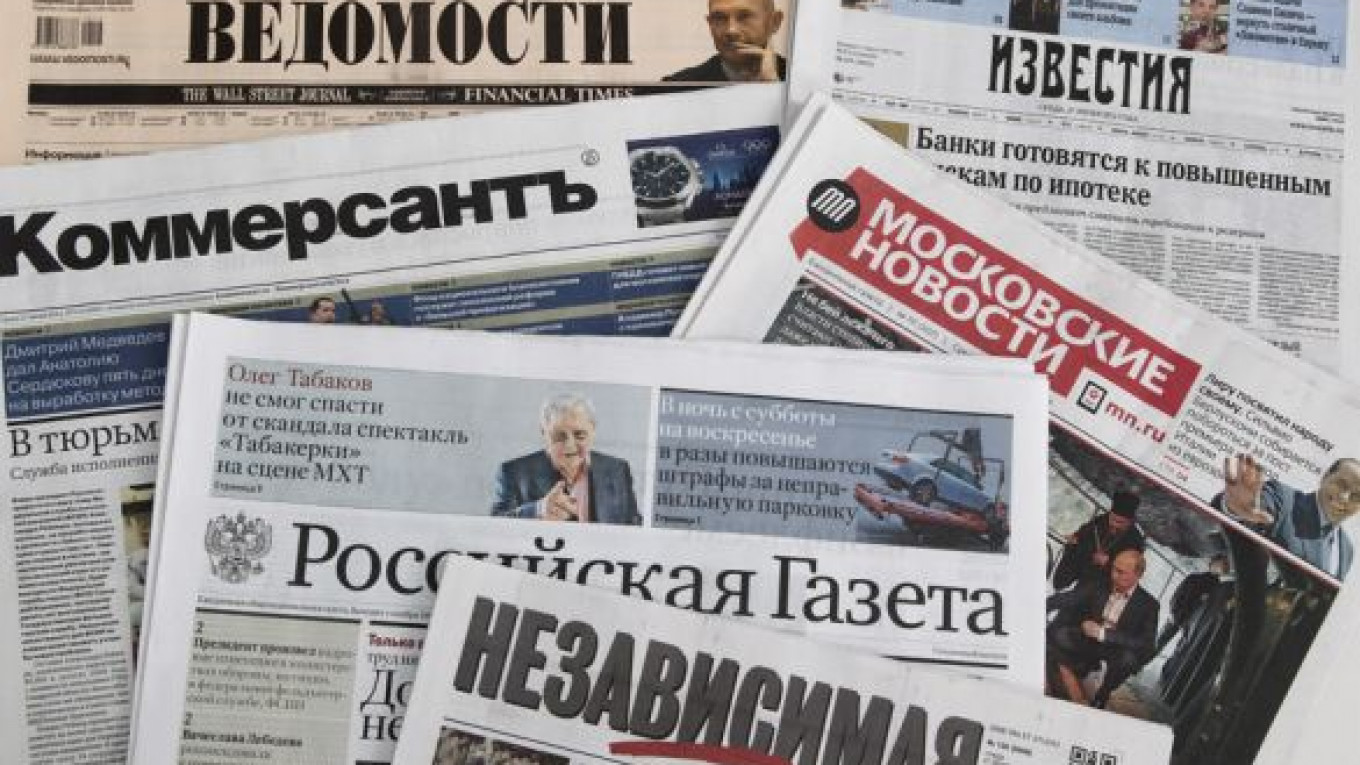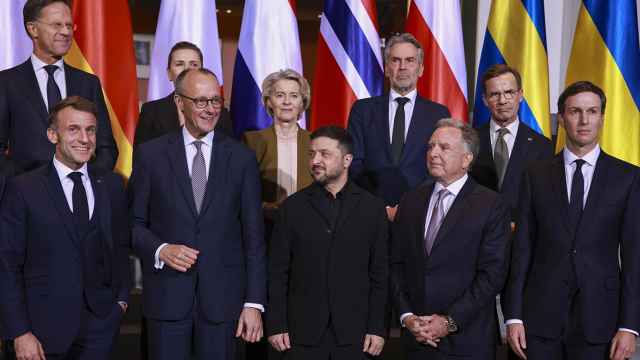Kommersant
1. Alexander Chernykh et al. article headlined "Education and Science Ministry defends dissertations" says that new rules of awarding academic degrees have been drafted given a number of scandals over forged dissertations; pp 1, 3 (743 words).
2. Afsati Dzhusoyti and Kirill Melnikov article headlined "Football is blood brother to hockey" says that the football team Dynamo will merge with the hockey team of the same name under the leadership of businessman Boris Rotenberg; pp 1, 12 (632 words).
3. Mikahil Serov article headlined "Gazprom retires" says that the gas giant Gazprom plans to issue infrastructure bonds and wants the Vneshekonombank to invest pension funds in them to finance the Russian section of the South Stream gas pipeline; pp 1, 9 (762 words).
4. Alexandra Bayazitova et al. article headlined "Bank of Russia turns out pockets" looks at the 2012 income declarations submitted by the Bank of Russia leadership; pp 1, 8 (872 words).
5. Taisia Bekbulatova and Natalya Gorodetskaya article headlined "Moscow closes lists" says that the last Moscow mayoral nominees, Yabloko party leader Sergei Mitrokhin and Alexei Navalny from RPR-Parnas, have been registered as official candidates; p 2 (609 words).
6. Maxim Strugov et al. article headlined "Nongovernmental organizations leave politics" says that a Perm district court has dismissed a lawsuit filed by the Perm Territory prosecutor's office against two noncommercial organizations that have refused to register as foreign agents, having not found any violations in their activity; p 3 (537 words).
7. Unattributed article headlined "They to stop copying off?" features comments by politicians and scientists on measures to combat plagiarism in dissertations; p 3 (560 words).
8. Oleg Rubnikovich article headlined "Investigators recollect modernization of Moscow Institute of Steel and Alloys" says that Education and Science Minister Dmitry Livanov and his deputy Natalya Tretyak will be targeted in a criminal case on the theft of budget funds at the Moscow Institute of Steel and Alloys; p 5 (461 words).
9. Ivan Safronov article headlined "Wrong hand taken in Proton" says that the wrong installation of angular-rate sensors is the cause of the failed launch of the Proton-M carrier rocket in early July; p 5 (406 words).
10. Sergei Strokan article headlined "Seats placed in Egyptian cabinet" says that the transitional government has begun operating in Egypt; p 6 (417 words).
11. Kirill Belyaninov and Yelena Chernenko article headlined "Edward Snowden runs between Congress and Kremlin" says that the U.S. is considering measures in response to Russia granting asylum to U.S. whistle-blower Edward Snowden. For its part, Russia does not see the Snowden case as a reason to worsen bilateral relations; p 6 (627 words).
12. Pavel Tarasenko article headlined "Britain estimates its nuclear potential" says that parliamentary debates on the future of the British nuclear potential have revealed serious disagreements in the British ruling coalition; p 6 (523 words).
Nezavisimaya GazetaVedomosti
1. Darya Tsilyurik article headlined "Snowden may receive Russian passport" says that US whistle-blower Edward Snowden may become a Russian citizen, but prominent Russian politicians and political experts have opposed this, thinking that this could worsen relations with the U.S.; p 1, 2 (566 words).
2. Lidia Orlova article headlined "Church to mount cross in Orient" says that the Orthodox Church plans to preach orthodoxy in Central Asia and China; p 1, 2 (675 words).
3. Alexandra Samarina article headlined "Yukos case at expert level" says that the Investigative Committee has recently begun to regularly question prominent human rights activists. Preparations for a third Yukos case against former head Mikhail Khodorkovsky, who is due to be released in autumn 2014, and warnings to experts to hold their peace are said to explain this; p 1, 3 (843 words).
4. Alexei Gorbachev article headlined "Russians have a go at people's gathering" says that blogger Alexei Navalny has been registered as a Moscow mayoral candidate. Meanwhile, dissenters, who protest against settling scores with political opponents via prosecution, will gather in central Moscow today; p 1, 3 (830 words).
5. Vladimir Skosyrev article headlined "Chinese economic miracle pales" says that the Chinese economy has slowed down and features a Russian expert's comment on the issue; p 1, 7 (739 words).
6. Ivan Rodin article headlined "Real humanization of criminal law" says that a group of Federation Council senators have suggested halving a bail for people charged with minor crimes; p 2 (695 words).
7. Editorial headlined "Europe does not have time to breathe enough of shale gas" says that France has opposed shale gas production on its territory and many European countries may follow the example, thus Russia may not worry about losing the European market; p 2 (505 words).
8. Svetlana Gavrilina article headlined "City of three revolutions recalls Alexander Ulyanov" says that a people's gathering will be held in St. Petersburg in support of blogger Alexei Navalny. This form of protest is becoming increasingly popular in the city, the article says; p 3 (645 words).
9. Alexander Panov article published in the Carte Blanche regular column headlined "Lack of peace agreement is abnormal", lays down conditions that are necessary for achieving success at Russian-Japanese talks on a peace agreement; p 3 (771 words).
10. Sergei Kulikov article headlined "Far East to be saturated with gas" says that the Russian authorities plan to provide all Far Eastern regions with gas and then begin gas supplies to the Asia-Pacific region; p 4 (605 words).
11. Yevgenia Novikova article headlined "Turkish premier afraid of revolution" comments on measures being taken by the Turkish leadership to prevent the Egyptian scenario from being implemented in the country; p 7 (717 words).
12. Yevgeny Grigoryev article headlined "Russians puzzle Berlin" says that Russia leads the top 10 world countries, whose citizens ask for political asylum in Germany, followed by Syria; p 7 (591 words).
1. Margarita Papchenkova and Olga Plotonova article headlined "Rosimushchestvo to give privatization against pledge" says that the Rosimushchestvo federal property agency is developing a new mechanism of privatization, which envisages giving bank loans to buyers of state assets against a pledge of privatized shares; pp 1, 4 (666 words).
2. Editorial headlined "Pension on trust" says that public opinion polls by various pollsters have shown that Russians positively assess certain provisions of the pension reform, especially late retirement; pp 1, 6 (537 words).
3. Alexei Nikolsky article headlined "Snowden receives ABC book" says that U.S. whistle-blower Edward Snowden will leave the Sheremetyevo Airport in a week provided that he receives temporary asylum in Russia; if he is not granted permanent asylum then, he will have to get back to the airport; p 2 (350 words).
4. Maria Zheleznova et al. article headlined "Medvedev not in limelight" says that the independent media analysis company Medialogia has compiled a media ranking of the Russian ruling duo. Putin is more frequently mentioned by the media than Medvedev, the company revealed; p 3 (653 words).
5. Editorial headlined "Snowden's joker" says that European societies may use U.S. whistle-blower Edward Snowden's disclosures to force their government restrict special services' powers, but this is not the case as regards Russia. Snowden is a trump card, which Russia may use to push through its initiatives on Syria and Iran, the editorial says; p 6 (233 words).
6. Oleg Salmonov article headlined "Skype is godsend for spy" says that the "big three" Russian mobile phone operators (MTS, Megafon and VimpelCom) and the communications company Rostelekom want the internet services Skype, Viber, WhatsApp and Facebook to be regulated by the law and controlled on national security grounds; pp 10, 17 (730 words).
7. Vasily Kashin article headlined "Second world: Yanukovych's hand longer than Kremlin's one" makes examples of successful operations to influence the U.S. policy and notes that only Russia has been facing difficulties in this respect; p 7 (717 words).
Izvestia
1. Yelena Sheremetova and Dmitry Yevstifeyev article headlined "Said Amirov returned from hospital to remand center" says that former Makhachkala mayor Said Amirov, charged with masterminding a murder, has been found reasonably sound in health so that he may be brought back to a remand center; pp 1, 4 (658 words).
2. Yulia Tsoy and Sergei Zvezda article headlined "Kremlin orders mathematical formula of information movement" says that the presidential administration has ordered a research to calculate a mathematical model, with the help of which Russian officials can more effectively communicate with ordinary Russians in the internet, thus boosting their image; pp 1-2 (751 words).
3. Igor Maltsev article headlined "Traditions are force" comments on the lynching of a man who killed two people in a road accident in the Maritime Territory and says that people in Russia's Far East traditionally have more savage customs than residents of central Russia; pp 1-2 (687 words).
4. Yevgeny Safronov and Tatyana Tyutyunnik article headland "Aide to arbitration judge got caught in bribery" says that an aide to a Moscow arbitration court judge has been detained while receiving a $80,000-worth bribe; pp 1, 4 (550 words).
5. Yekaterina Panina article headlined "Human rights council to ask to amend law about noncommercial organizations" says that the presidential human rights council will once again ask President Putin to amend the law about noncommercial organizations. Council members will meet Putin on 3 September; p 2 (623 words).
6. Alexander Yunashev and Alexander Matveyev article headlined "Putin said relations between countries more important that special services' squabbles" features Putin's comments on the U.S. whistle-blower Edward Snowden's case; p 2 (474 words).
7. Anna Akhmadiyeva interview with the head of the State Duma committee for international affairs, television presenter Alexei Pushkov, headlined "'Our media is more independent than U.S. one'", who speaks about his author program Postskriptum on the Moscow city government-controlled channel center television, the censorship in Russia and a danger of liberalism; p 3 (1,457 words).
8. Sergei Podosenov article headlined "Nikolay Levichev offers head of government and 'policemen of 19th century'" focuses on Moscow mayoral nominee from the A Just Russia party Nikolai Levichev's election manifesto; p 5 (754 words).
9. Tigran Oganesyan and Natalya Savisko article headlined "Grachya Arutyunyan to get clothes from Armenian embassy" says that improper clothing of driver Arutyunyan, who is to be tried for causing deadly road accident, has caused protests in Yerevan in front of the building of the Russian embassy. Armenian nationalist movements have taken advantage of this to fan anti-Russian sentiments in the country; p 7 (529 words).
10. Konstantin Volkov article headlined "North Korean leader announces national mushrooming" features Russian experts' comments on steps being taken by the North Korean leadership to solve food problems; p 7 (584 words).
11. Maria Gorkovskaya article headlined "Egyptian government formed with Islamists" provides Russian experts' comments on the establishment of the transitional government in Egypt and Islamists' refusal to enter it; p 7 (470 words).
12. Political analyst Kirill Benediktov article headlined "Right of asylum" says that U.S. whistle-blower Edward Snowden has submitted to the Federal Migration Service an application to give him asylum in Russia and contemplates the consequences of the move for Russia's relations with the West; p 9 (971 words).
13. Historian Stanislav Khatuntsev article headlined "Government of hope and risk" looks at the line-up of the Egyptian transitional government; p 9 (738 words).
Rossiiskaya Gazeta
1. Larisa Barykina interview headlined "Let us meet near fountain" with the new director of Moscow's Bolshoi Theatre, Vladimir Urin, speaking about the forthcoming changes at the theatre; pp 1, 8 (1,640 words).
2. Sergei Toporkov article headlined "Acute Tsugol [firing range]" describes President Putin's visit to the Tsugol firing range in the Zabaikalskaya region to watch the final stage of a large-scale military drill involving servicemen from the Central and Eastern military districts; p 2 (799 words).
3. Anna Zakatnova article headlined "Seconds of glory" says that according to the Central Electoral Commission, the airtime to cover political parties' activities in June was 82 hours 51 minutes. The United Russia ruling party ranks first, followed by the Communist Party, the Liberal Democrat Party and the A Just Russia party; p 2 (456 words).
4. Vitaly Petrov article headlined "I see Sochi" reports on Prime Minister Dmitry Medvedev's visit to Kazan, where the World Student Games ended yesterday; p 3 (718 words).
Moskovsky Komsomolets
1. Maxim Grigoryev article headlined "They want to remove Skype from Russians" says that the "big three" Russian mobile phone operators (MTS, Megafon and VimpelCom) and the communications company Rostelekom are displeased with the operations of the internet services Skype, Viber and WhatsApp in Russia because foreign special services may collect Russian users' personal date and suggested regulating these services; pp 1, 4 (592 words).
2. Zhanna Golubitskaya article headlined "Pussy Riot quarrel over oil video clip" says that the Pussy Riot punk group has posted a new video on YouTube, which shows girls in balaclavas vandalizing pipelines and portraits of Russian state officials, accusing them of appropriating petrodollars. The group members have split over the video clip; pp 1, 3 (643 words).
3. Natalya Rozhkova and Dmitry Katorzhnov article headlined "Judgment Day for Alexei Navalny " says that a Kirov district court is expected to pass today a sentence on blogger Alexei Navalny, targeted in the KirovLes timber company case, and contemplates the future of Navalny; pp 1, 4 (1,449 words).
4. Andrei Yashlavsky interview headlined "Relations higher than the lowest" with Sergei Rogov, director of the U.S. and Canada Institute at the Russian Academy of Sciences, speaking about the U.S. whistle-blower Edward Snowden case and what consequences it will have for Russian-U.S. relations; pp 1, 4 (2,417 words).
5. Konstantin Smirnov article headlined "Putin stumbles over his own vertical" says that Putin is displeased with the performance of Russian government officials and is tightening "executive power" screws by managing ministers by-passing the prime minister because he has to prove voters that he is very effective as before; pp 1-2 (808 words).
6. Yekaterina Petukhova article headlined "'Foreign agent' memorial" says that the St. Petersburg city court has dismissed a lawsuit filed by a prosecutor's office against the anti-discriminatory center Memorial over the latter's refusal to register as a foreign agent; p 2 (344 words).
7. Olga Rakhimdzhanova article headlined "Fattened athletes and ministers in subway" describes Prime Minister Medvedev's visit to Kazan, which is hosting the World Student Games; p 2 (1,013 words).
8. Valeria Zhernakova article headlined "They want to wreck Sochi Olympics over whistle-blower" says that a U.S. senator has called on President Barack Obama to boycott the 2014 Winter Olympics in Sochi if Russia gives political asylum to U.S. whistle-blower Edward Snowden and features a Russian expert's comment on the issue; p 3 (495 words).
9. Igor Subbotin article headlined "How will political asylum help Snowden?" provides Russian human rights activists' comments on giving asylum to U.S. whistle-blower Edward Snowden; p 3 (374 words).
10. Olga Grekova article headlined "Moscow mayoral candidates publish their incomes" says that four registered Moscow mayoral candidates have submitted the 2012 income and property declarations. None of them have foreign property and foreign assets; p 7 (377 words).
11. Sergei Terekhov article headlined "Universiade ends. Forget it" says that the World Student Games in Kazan are a spanking lie and Russian sportsmen's victories are propaganda items for Russians since the country cannot boast of outstanding achievements in any areas; p 12 (965 words).
Noviye Izvestia
1. Margarita Alekhina article headlined "They find scapegoats" says that the Justice Ministry has enhanced the federal list of extremist materials and notes that schools and libraries suffer from the fight against extremism more than xenophobes; pp 1, 5 (2,148 words).
2. Anna Kumitskaya article headlined "Symbolic punishment" says that the Left Front movement has asked the Moscow prosecutor's office to permit it to resume its operations since all violations revealed earlier have been removed; p 2 (504 words).
3. Valery Rubtsov article headlined "Whom did we score off?" welcomes Russia's results at the World Student Games, notes that the Russian sports leadership seemed to wish to win out over China and states that it is wrong to say that the games looked like the beating of children by Russia because its team was presented mainly by Olympic champions; p 6 (843 words).
4. Munich-based Adel Kolisnichenko article headlined "Season of bugs" looks at Germany's reaction to U.S. whistle-blower Edward Snowden's revelations; p 2 (500 words).
RBC Daily
1. Svetlana Makunina article headlined "Political formula" says that senator Andrei Klishas has commented on new amendments to the law on NGOs and explained how political activity will be defined in the law; p 2 (750 words).
A Message from The Moscow Times:
Dear readers,
We are facing unprecedented challenges. Russia's Prosecutor General's Office has designated The Moscow Times as an "undesirable" organization, criminalizing our work and putting our staff at risk of prosecution. This follows our earlier unjust labeling as a "foreign agent."
These actions are direct attempts to silence independent journalism in Russia. The authorities claim our work "discredits the decisions of the Russian leadership." We see things differently: we strive to provide accurate, unbiased reporting on Russia.
We, the journalists of The Moscow Times, refuse to be silenced. But to continue our work, we need your help.
Your support, no matter how small, makes a world of difference. If you can, please support us monthly starting from just $2. It's quick to set up, and every contribution makes a significant impact.
By supporting The Moscow Times, you're defending open, independent journalism in the face of repression. Thank you for standing with us.
Remind me later.






